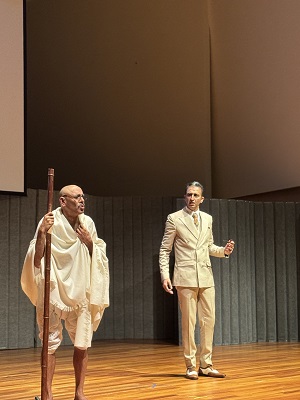Quaid and Mahatma Visit South Asia in 2023 - A Review of Gandhi and Jinnah Return Home
By Rohan Singh


Gandhi and Jinnah Return Home is a powerful and thought-provoking play in three acts, written by Ambassador Akbar Ahmed and directed by Ms Manjula Kumar. The play delves into the lives and legacies of two of the most influential figures in the history of the Indian subcontinent, Mahatma Gandhi and Quaid-i-Azam Muhammad Ali Jinnah. While the play is based in history, it unfolds against the backdrop of a fictional scenario where these two leaders return to their respective countries in the modern day to witness how their vision is being interpreted today.
Gandhi and Jinnah Return Home was performed for the first time at American University’s Katzen Arts Center in Washington DC on October 21st and 22nd.
The play opened to a conversation between Clementine and Sir Winston Churchill (played by Mary Anthony and Peter Poggioli respectively) discussing British identity in the wake of India’s independence. They are then joined by Gandhi and Jinnah (played by Sri Mirajkar and Farhan Bhaba respectively) and a contentious conversation ensues.
Gandhi and Jinnah, both revered for their roles in India's struggle for independence and Pakistan's creation, engage in a heated exchange over the merits and necessity of the Partition. Their mutual distaste for Churchill's role in the Partition becomes evident, setting the stage for a rich exploration of historical and political nuances.
When asked why he wrote this play, Ambassador Ahmed said, “ I wanted to write this play because I felt that a message of peace and unity was needed. I have always worked to advocate for this but, I especially felt that rising tensions warranted a discussion on peace in South Asia.”
One of the most striking aspects of this play is the exploration of the often-neglected perspectives of the women involved in these historical events. The second scene introduces Kasturba Gandhi, Fatima Jinnah (played by Nisha Narayan and Sujata Avasthi), and Clementine Churchill. This conversation sheds light on the profound influence these women had on these leaders' lives and political journeys. It is a poignant reminder of the crucial but frequently overlooked role women played in the independence movement and the shaping of the subcontinent's destiny.
For Director Manjula Kumar, this play was a labor of love toward belief in peace which she has held her whole life and women’s empowerment was an important aspect she wanted to cover, “This is a very meaningful and fulfilling journey for me. All my life I have held a very strong belief in Peace and Harmony. I want to spread the values of human rights, secularism and women’s empowerment.”
The heart of the play lies in Gandhi and Jinnah's journey back to their respective homelands, with scenes set in Karachi and Gujarat. Their observations and interactions with the people of the two countries allow the audience to witness the stark contrast between their visions and the reality on the ground. In Karachi, Jinnah stumbles upon a mob and witnesses the conversation of a law professor and angry student (played by Farrukh Iqbal and Rohan Singh) who is a part of the mob. In Gujarat, Gandhi encounters a similar situation with Journalist Meena Kumari and Political Party Worker Anil Kapoor (played by Soumya Kini and Robert Nazareth). The disappointment and disillusionment they experience are deeply moving, and they serve as a powerful critique of the current state of South Asia.
As a young South Asian American, I found "Gandhi and Jinnah Return Home" to be an inspiring and thought-provoking experience. It highlights the enduring relevance of the leaders' messages of peace, unity, and non-violence. The play encourages us to reflect on the complex historical legacy of the subcontinent and consider the contemporary challenges that continue to shape the region. In fact, I chose to be a part of this play in order to help spread this message. I believe that pluralism and embracing diversity are the only way forward, not just for the subcontinent, but for the world. Magically, our cast represents almost every major religion with Muslims, Hindus, Sikhs, Christians, and Jews all coming together to spread this message of peace and unity.
Peter Poggioli, who plays Sir Winston Churchill, was not entirely aware of the Partition prior to his role in this play. He says, “I have learned so much about the Partition and the impacts on present-day India and Pakistan. The story is unique, but unfortunately repeats itself in different ways in countries and regions previously colonized. I hope to spread the message of Peace and Harmony...the play's primary message.”
The play's exploration of the contentious issue of the Partition is a compelling and timely choice. It forces the audience to confront the consequences of this decision that continues to affect the lives of millions of people on both sides of the India-Pakistan border. The fact that Gandhi and Jinnah themselves grapple with the implications of this decision adds an extra layer of depth to the narrative.
Farhan Bhaba, who plays Jinnah, felt that addressing this subject with a diverse cast was one of the most fulfilling parts of this play. “This play presents insights into the separation of Pakistan from India in 1947 which, to date, is a highly debated subject. To have worked on this project intimately while building great camaraderie and positivity with a very diverse cast and it has been an extremely fulfilling journey.”
Sri Mirajkar, who plays Gandhi, feels that re-examining Gandhi’s legacy is needed, “Gandhi’s actions and life-lessons are so relevant in the tumultuous political and war-torn times we live in today.” Farhan Bhaba wanted to help provide a more holistic picture of the Quaid-i-Azam through his portrayal of Jinnah, “By playing the role of Jinnah, I try to create more interest in his character in order to generate awareness about his historic contribution towards ensuring rights of minorities.”
The portrayal of Kasturba Gandhi, Fatima Jinnah, and Clementine Churchill is a standout feature of the play. Their voices serve as a reminder that history is not just a collection of male-dominated narratives but a tapestry of diverse experiences. Toward the end of the play, all three women join the men on the stage proclaiming that they will walk with them instead of behind them. Women clearly take center stage in this play and Soumya Kini’s role as Meena Kumari is no different. Soumya says that this is what made her want to be a part of the play, “The character of a strong and outspoken woman attracted me to this role.”
The play raises many complex questions and does not always offer clear answers. According to the play’s writer, Ambassador Akbar Ahmed, that may be the whole point. He states that a discussion is the true goal of this play, “ I’m not hoping that the audience will leave with any specific message or answers. My goal is to start a conversation and discussion surrounding peace.”
Ms Kumar, the play’s director, shares a similar sentiment toward the play’s goal, “I strongly believe in the Education about the Arts and through the Arts. Drama with all its tools is especially exciting and creative. At the end of the play I would like the audience to experience a catharsis, a healing process and leave highly stimulated to stir a serious balanced debate with an open mind.”
"Gandhi and Jinnah Return Home" is a remarkable piece of theater that successfully explores the legacies of two iconic leaders and their impact on the Indian subcontinent. It engages with historical events, complex political issues, and the enduring message of peace and unity. As a young South Asian American, I found the play to be a moving and inspiring experience that encourages us to reflect on our shared history and the path to a more peaceful future.
Gandhi and Jinnah Return Home is going to be performed again on November 11th at the Cultural Arts Center at Montgomery College, November 19th at the BlackRock Arts Center in Germantown MD, and December 1st the Harold and Sylvia Greenberg Theatre in Washington DC.
(Rohan Singh is a Senior and Honors Student at American University’s School of International Service. His research interests include Human Rights, Rights for Women & Girls, and Religious Peace Building. Rohan developed these interests over the two years he interned for the US Mission to the UN Human Rights Council. He has been an intern at the White House and is an avid researcher, receiving the AU Summer Artists and Scholars grant for his work. Rohan currently serves as the Program Assistant to the Ibn Khaldun Chair of Islamic Studies at American University.)

